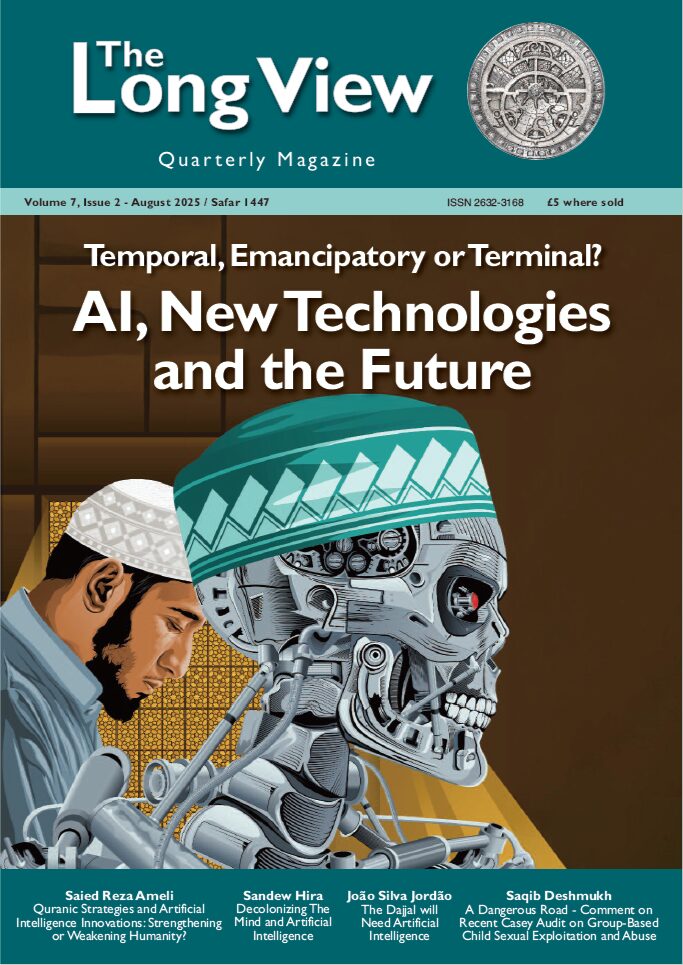Temporal, Emancipatory or Terminal? AI, New Technologies and the Future
Volume 7 – Issue 2 – August 2025 / Safar 1447
Essays
Editorial
For many of us the idea of artificial intelligence conjures up frightening images of insurrectionary cyborgs waging war against their human creators in an epic battle for planetary domination. Our fears are not unfounded. As with many new technologies, the frenetic pace at which AI is developing rightly gives rise to concerns about its ethical direction and the capacity of humankind to misuse its potential for destruction instead of development.
In the first of the essays in this issue, themed around AI, Saied Reza Ameli explores the potentialities of this new epistemological paradigm and how in its current formative stage it should be shaped to produce knowledge and mechanisms that enhance human life (physically and spiritually) and benefit humankind. This is a necessarily lengthy but extremely enlightening piece in which the author makes accessible the complex world of AI, explaining its development, potentialities and limitations in the light of Divine principles.
It goes without saying that all scientific and technological development must be subject to the fixed verities of the divine because it is only by doing this that mankind can diminish fallibility and chart a course toward human growth and perfection. According to Ameli, it follows then that if we are to successfully harness AI we need to define its contours according to Quranic principles and injunctions. With this in mind, Muslims should embrace AI. “The Qur’an, grounded in the principle of human dignity (Tabarsi, 1150[536AH], Vol. 5: 439), adopts a fundamentally affirmative stance towards all pursuits that augment human potential through the revelation of existential truths and the establishment of a transcendent foundation.”
Our second piece by the decolonial scholar and activist Sandew Hira expounds on the strides that have already been made using AI in the field of decolonial studies. The first step was to recognise the colonial bias of AI systems that leads them to produce Eurocentric knowledge. Sandew demonstrates this by way of real life examples of engagements with AI systems such as ChatGPT and Gemini. Like Saied Ameli, he does not think the answer to AI lies in raging against the machine. “In the future AI will dominate every aspect of our life. It is a technology that rapidly penetrates every section of society. Activists from the decolonial movement must be prepared to use AI in our struggle and not fight against it and reject it,” he writes.
Crucially for Hira, when pressed, AI systems all recognise that knowledge isn’t something that is produced objectively and that they do indeed carry, and are in turn informed by, colonial prejudices. It is this very awareness that is their salvation according to Hira because it makes them capable of empathising and adapting.
For Hira, the idea of AI systems as a tool of knowledge manipulation is only partially true. Since they are trained on Eurocentric data their first instinct is to deliver a Eurocentric response. But if the user pushes back, they also have the capacity to explore other responses that fit the framework of the user. They are therefore capable of learning which makes them amenable to being utilised for decolonised knowledge production. Hira is passionate about this endeavour and determined to take it from concept to reality. To that end, he is currently co-developing a mobile phone app that seeks to educate people about the history of the world from a decolonial perspective.
The third piece in this issue by João Silva Jordão. It is an exploration of the dangers of AI and how it might be harnessed by the forces of darkness to actualise eschatological events. Jordão approaches the subject from the standpoint of the perennial desire of Dajjalic elites to dominate the masses. In their hands, it is entirely conceivable that end of times disasters foretold by the Prophetic tradition could be effected by AI, using its potent ability to process information.
One such prophesied development is the restoration to life of one’s deceased parents. According to a hadith, this will be one of Dajjal’s deceptions in his quest to convince humanity to follow him. Jordão speculates that if we take into account some very specific technological novelties and their capacities, we may find some clues as to how the Dajjal might fake the appearance of someone’s deceased parents. In a world where AI can be used to replicate the voices of dead celebrities for applications such as reading audiobooks it is not far-fetched to imagine how it may also be able to fake the resurrection of our ancestors.
Our final essay departs from AI to look at the unremitting public hysteria surrounding the far right “grooming gang” agenda that has taken hold in Britain. Again this summer, racists are attempting to exploit this wholly confected and baseless narrative to attack Muslims and minoritised ethnic communities. The sheer weight of pressure that has been brought to bear on the government has forced it to concede a full national statutory inquiry into the issue, capitulating to elements for whom the welfare of children is only a thinly-veiled front for primitive Islamophobia and xenophobia.
Activist, youth worker and writer Saqib Deshmukh unpacks the recent Casey report which recommended a national inquiry. He sees it as “a dangerous road… that is full of racist tropes and Islamophobia”, one that is littered with the corpses of victims of far-right violence. In the final analysis the manufactured moral panic is a device to transfer blame from the authorities that systemically failed the child victims of sexual abuse to an all too easily demonised demographic.
There is a lot to think about in this issue. As always please send us your thoughts and join us in the necessary conversations for a better, brighter and liberated future.

